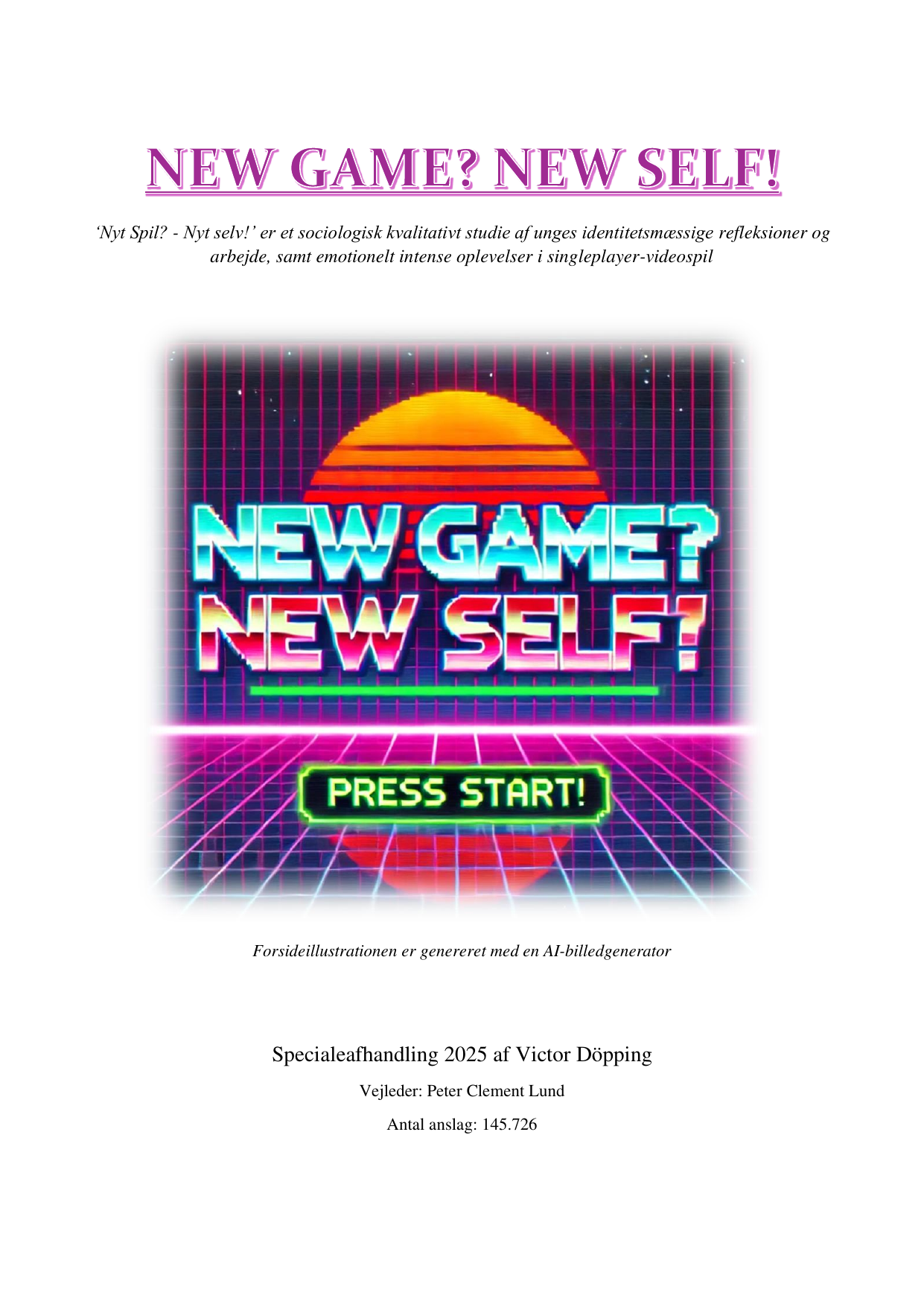
Nyt Spil? - Nyt Selv!: ‘Nyt Spil? - Nyt Selv!’ - et sociologisk kvalitativt studie af unges identitetsmæssige refleksioner og arbejde, samt emotionelt intense oplevelser i singleplayer-videospil
Oversat titel
New Game? - New Self!: 'New Game? - New Self!' - a sociological qualitative study of youths identity-based reflections and labour, as well as emotionally intense experiences in singleplayer-video games
Forfatter
Semester
4. semester
Uddannelse
Udgivelsesår
2025
Afleveret
2025-01-07
Antal sider
71
Abstract
The present thesis examines how young gamers experience single-player video games through the following research question: How does young gamers experience emotionally intense situations in singleplayer video games, and how do they utilize the game world and situations that play out within here for identity-based reflection? Through a qualitative study utilizing semi-structured interviews with six gamers between the ages of 21-24, the research employs phenomenological and agential realist methodologies alongside grounded theory. The analysis unfolds across three thematic dimensions: Being in the Game, Emotional Resonance, and Multiple Identities. By utilizing Hartmut Rosa’s theory on resonance, theoretical points from Maurice MerleauPony, theory on multiple identities and identification as well as identity hierarchies defined by Ashfort & Schinoffs and Lakshmi Ramarajan respectively. Findings reveal that single-player games provide deeply immersive experiences, engaging players' sensory perceptions, narrative agency, and identification with avatars and the situations which they find themselves in. The gamers interviewed describe their avatars as extensions of themselves, allowing for exploration of social phenomena, emotions, and identity. Music, graphics, and agency in decision-making amplifies the emotional intensity they experience, as well as allowing for a space and opportunity for reflection. Furthermore, players reported emotionally resonating with non-playable characters and narratives, challenging previous notions of parasocial relationships. These interactions contribute to gamers' understanding of moral dilemmas, offering opportunities to rehearse social competencies in simulated contexts. The study suggests that single-player gaming can function as a meaningful and transformative practice, and enable gamers to explore alternative roles, and reflect on their aspirations and behaviors. The thesis concludes that single-player video games hold potential for psychosocial development and continuous identity negotiations. It advocates for further quantitative research to generalize these findings and explore applications in supporting socially vulnerable youth through gaming as a reflective and educational tool.
The present thesis examines how young gamers experience single-player video games through the following research question: How does young gamers experience emotionally intense situations in singleplayer video games, and how do they utilize the game world and situations that play out within here for identity-based reflection? Through a qualitative study utilizing semi-structured interviews with six gamers between the ages of 21-24, the research employs phenomenological and agential realist methodologies alongside grounded theory. The analysis unfolds across three thematic dimensions: Being in the Game, Emotional Resonance, and Multiple Identities. By utilizing Hartmut Rosa’s theory on resonance, theoretical points from Maurice MerleauPony, theory on multiple identities and identification as well as identity hierarchies defined by Ashfort & Schinoffs and Lakshmi Ramarajan respectively. Findings reveal that single-player games provide deeply immersive experiences, engaging players' sensory perceptions, narrative agency, and identification with avatars and the situations which they find themselves in. The gamers interviewed describe their avatars as extensions of themselves, allowing for exploration of social phenomena, emotions, and identity. Music, graphics, and agency in decision-making amplifies the emotional intensity they experience, as well as allowing for a space and opportunity for reflection. Furthermore, players reported emotionally resonating with non-playable characters and narratives, challenging previous notions of parasocial relationships. These interactions contribute to gamers' understanding of moral dilemmas, offering opportunities to rehearse social competencies in simulated contexts. The study suggests that single-player gaming can function as a meaningful and transformative practice, and enable gamers to explore alternative roles, and reflect on their aspirations and behaviors. The thesis concludes that single-player video games hold potential for psychosocial development and continuous identity negotiations. It advocates for further quantitative research to generalize these findings and explore applications in supporting socially vulnerable youth through gaming as a reflective and educational tool.
Emneord
